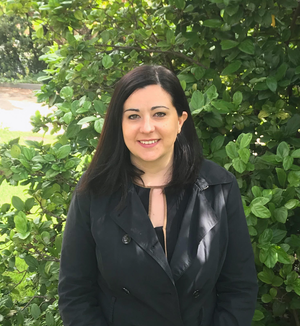Sara Siddi
Researcher
"For us patient participation is crucial to developing the project and improving their quality of life in the future."
Dr Sara Siddi from the Sant Joan de Déu Research Institute · Sant Joan de Déu Health Park is a member of the RADAR-CNS European project, which was launched in 2016 and will end in March 2022. The project has already recruited more than 400 participants from around Europe suffering from depression
What does the RADAR-CNS project consist of?
RADAR-CNS (Remote Assessment of Disease and Relapse - Central Nervous System) is a European project led jointly by King's College London and the pharmaceutical company Janssen NV. The RADAR-CNS study is funded by the Innovative Medicines Initiative (IMI, a public and private partnership set up between the federations of European pharmaceutical industries and associations, EFPIA and the European Union). It includes 22 organisations from Europe and the United States and brings together experts from various fields: psychiatrists, psychologists, neurologists, computer engineers, and statisticians from all over the world, who are working together to develop new tools, such as apps and bracelets, to measure the factors and circumstances affecting patients who suffer from depression, multiple sclerosis and epilepsy.
The main goal of RADAR-CNS is to enhance the early detection of symptoms and change the way these three conditions are approached and treated.
What was the reason for choosing three diseases that are seemingly differing in their symptomatology?
The three conditions (depression, multiple sclerosis and epilepsy) are all alterations of the central nervous system. While the symptoms and impairment experienced by people with each illness are different, all three have a significant impact on patient well-being. Most symptoms and episodes occur outside the clinical setting. Continuous monitoring with these electronic devices of a person's mood, everyday activity and sleep quality can help them better understand their condition and its evolution. In the specific case of the Sant Joan de Déu Health Park, we are focussing on the study of people with major depression. The Pere Mata Institute (Reus), the Hospital Clínico San Carlos (Madrid) and various primary care centres managed by the Catalan Health Institute are also collaborating.
The aim is to analyse what day-to-day measurements can be help to better understand existing symptoms of depression in order to predict possible relapses in the future.
If someone wants to take part in the study, what do they have to do?
As a first option, those interested in participating should contact their GP, psychologist or psychiatrist directly. The organisers can also be contacted by email at radar-mdd(ELIMINAR)@pssjd.org or through the project website.
In the case of participants with depression, they must meet the following conditions to be able to participate: to have been diagnosed with major depression and have suffered at least two episodes during their lives.
Once accepted for the study, what role will the participants play?
Participants will receive questionnaires on their mobile phones, asking them to answer questions about their mood and everyday activities. In addition, pulse rate, number of steps walked and sleep quality will be recorded in the background. All this information will serve to provide a general view of the participants' health and well-being.
Participants will be asked to participate for two years provided they are willing, given that participation is voluntary like in any other project.
How will the results be transferred to day-to-day clinical practice?
As in any research, what we want to achieve is a clinical transfer that can be used in the clinical setting. The information obtained will help therapeutic teams develop personalised treatment plans and improve the therapeutic care provided.
In this project the idea is to develop a set of measuring devices that warn people when they are about to have a relapse. It would also be interesting if the app itself was able to notify the patient's GP and/or psychologist directly and allow communication between them.
Why should people suffering from depression participate in this study?
For two basic reasons. One is that they will form part of a research project aimed at helping them reflect on and better understand their state of health; and the other is that it will help them to better manage and mitigate their symptoms. All the participants play a key role in the development of new technological tools for measuring health.
For us, the patients themselves are the people best placed to help us understand the disease; they can show us what these conditions consist of so that we can help them to control them and improve the care provided. We want the patients to feel they are playing an active role in the project, which is why it is so important to receive their feedback.
What makes this project different to similar ones that also use new technologies?
This project provides us with a means of obtaining a full assessment of how a person feels at any given time. On the one hand, subjective measurements are made through the answers to the questionnaires and, on the other hand, the app provides us with objective data (for example, physiological indicators). Data is also collected at night in order to observe changes in sleep patterns. All this data is automatically transferred to a server so that the participants do not have to concern themselves with sending it.
RADAR-CNS receives funding from the Innovative Medicines Initiative 2 Joint Undertaking under grant agreement No 115902. This Joint Undertaking receives support from the European Union's Horizon 2020 research and innovation programme and EFPIA. See www.imi.europa.eu for more details.


